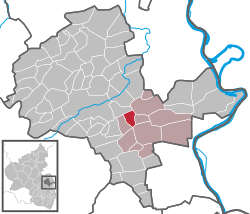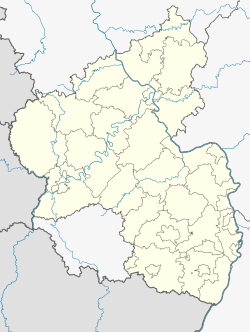Hochborn
Hochborn (until 1971: Blödesheim) is an Ortsgemeinde – a municipality belonging to a Verbandsgemeinde, a kind of collective municipality – in the Alzey-Worms district in Rhineland-Palatinate, Germany.
Hochborn | |
|---|---|
 Coat of arms | |
Location of Hochborn within Alzey-Worms district  | |
 Hochborn  Hochborn | |
| Coordinates: 49°43′26″N 8°12′03″E | |
| Country | Germany |
| State | Rhineland-Palatinate |
| District | Alzey-Worms |
| Municipal assoc. | Wonnegau |
| Government | |
| • Mayor | Herwarth Mankel |
| Area | |
| • Total | 3.56 km2 (1.37 sq mi) |
| Elevation | 290 m (950 ft) |
| Population (2018-12-31)[1] | |
| • Total | 424 |
| • Density | 120/km2 (310/sq mi) |
| Time zone | CET/CEST (UTC+1/+2) |
| Postal codes | 55234 |
| Dialling codes | 06735 |
| Vehicle registration | AZ |
| Website | www.hochborn.de |
This Ortsgemeinde earned a Germany-wide media presence in early 2001 when a television spot from the 1970s made by the then Südwestfunk was broadcast by Stefan Raab on his show TV total; it was about the place called Blödesheim. Stefan Raab then visited Hochborn during Carnival (locally known as Fastnachtszeit) and for a few weeks thereafter campaigned for a return to the name Blödesheim.[2]
Blödes Heim in German means "dimwitted home".
Geography
Location
The municipality lies in Rhenish Hesse and has roughly 500 inhabitants. It belongs to the Verbandsgemeinde of Wonnegau, whose seat is in Osthofen.
At 290 m above sea level, Hochborn is among the highest places in the Rheinhessisches Hügelland (Rhenish-Hessian Uplands). Even so, the municipality nevertheless has a wealth of water, which might account for the choice of the new name: the placename ending —born is a form of the German word Brunnen, which can mean "spring", "fountain" or "well". The word hoch means "high".
Climate
Yearly precipitation in Hochborn amounts to 541 mm, which is very low, falling into the lowest tenth of the precipitation chart for all Germany. Only at 9% of the German Weather Service’s weather stations are even lower figures recorded. The driest month is February. The most rainfall comes in July. In that month, precipitation is 1.9 times what it is in February. Precipitation varies moderately. At 34% of the weather stations, lower seasonal swings are recorded.
History
In 782, Hochborn had its first documentary mention when Theo and Anthilde von Blatmarsheim (the last word being the village's original name) donated 15 Morgen of cropland and a meadow to Lorsch Abbey on 23 April that year. They further made over other holdings of theirs in Blatmarsheim to the Abbey, as described on 9 October 788. It is believed that the village's original name might have derived from the kin of a Frankish settler named Blatmar or Blitter.[3]
Over the last 1,200 years, the municipality's name has changed several times. The last name change came on 1 March 1971 when the old name Blödesheim was dropped in favour of Hochborn.[4][5] The change was approved by local voters with a margin of 96%. The old name had not only led to annoyance and teasing, but had also been hindering wine sales.[6] The names borne by the village over the ages are:[7]
- 782: Blatmarsheim
- 788: Blatmarisheim
- 789: Blittersheim
- 1070: Blettenesheim
- 1261: Bleidinsheim
- 1341: Bledinsheim
- 1348: Bledensheim
- 1427: Plödesheim
- 1497: Bledesheim
- 1602: Blödeßheim
- 1613: Blödesheim
- 1971: Hochborn
Not much else is known about Hochborn's history, likely because it was not only a very small place in days gone by, but also a very poor one.
Politics
Municipal council
The council is made up of 8 council members, who were elected by majority vote at the municipal election held on 7 June 2009, and the honorary mayor as chairman.[8]
Mayors
The office of mayor in Blödesheim, as it was then known, was not reinstituted after the Congress of Vienna until 1832. The municipality's mayors since then are:[9]
- 1832–1837: Georg Ochs
- 1837–1843: Christian Jene
- 1843–1853: Jacob Claß
- 1853–1882: Georg Ochs (the first-named mayor’s son)
- 1883–1899: Philipp Schaffner
- 1899–1914: Peter Schaffner (Philipp’s son)
- 1914–1930: Jacob Jene II
- 1930–1945: Ludwig Claß
- 1945–1946: Jacob Flörsch and Peter Blum (provisional, after the defeat and before new elections)
- 1946–1974: Joh. Georg Dürkes
- 1974–1999: Ludwig Abel
- 1999–2004: Kurt Knell
- 2004 – present: Herwarth Mankel
Coat of arms
The municipality’s arms might be described thus: Per fess sable a demi-lion rampant Or armed and langued gules, and argent five oakleaves erect in fess, the second and fourth abased, vert.
The lion is the Palatine Lion.
Culture and sightseeing
Buildings
- Saint Lawrence’s Evangelical Church (Laurentiuskirche) was built or at least first mentioned in the historical record in 1070 as the Kapelle von Blettenesheim (“Chapel of Blettenesheim”).
- On Langgasse (lane) is found a warrior’s memorial.
Economy and infrastructure
Hochborn is one of only three places in Rhenish Hesse that have no winegrowing within their own limits.[10]
References
- "Bevölkerungsstand 2018 - Gemeindeebene". Statistisches Landesamt Rheinland-Pfalz (in German). 2019.
- Hysterie um Raabs „totalen TV-Blödsinn“ gut verkraftet – Rhein Main Presse municipal portrait from Friday, 11 March 2005, page 14
- Hochborn’s history
- Die verschiedenen Ortsnamen im Wandel der Zeit
- Statistisches Landesamt Rheinland-Pfalz - Amtliches Gemeindeverzeichnis 2006 Archived 2011-07-18 at the Wayback Machine
- Note about the name change on Hochborn’s website
- Hochborn’s history
- Kommunalwahl Rheinland-Pfalz 2009, Gemeinderat
- Hochborn’s history
- Frischer Wind auf Feldern und in Köpfen – Hochborn setzt auf Lebensqualität und Dorfgemeinschaft/Berühmtheit als "Blödesheim" in the Rhein Main Presse from 29 July 2008
External links
- Official website

- Hochborn in the collective municipality’s Web pages (in German)
- Versuch einer vollständigen Geographisch-Historischen Beschreibung der Kurfürstl. Pfalz am Rheine. 4 Bände. Frankfurt und Leipzig 1786-1788 by Johann Goswin Widder on the pages of the University of Mainz (in German)